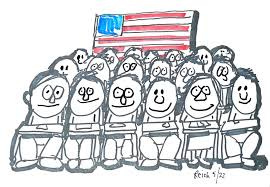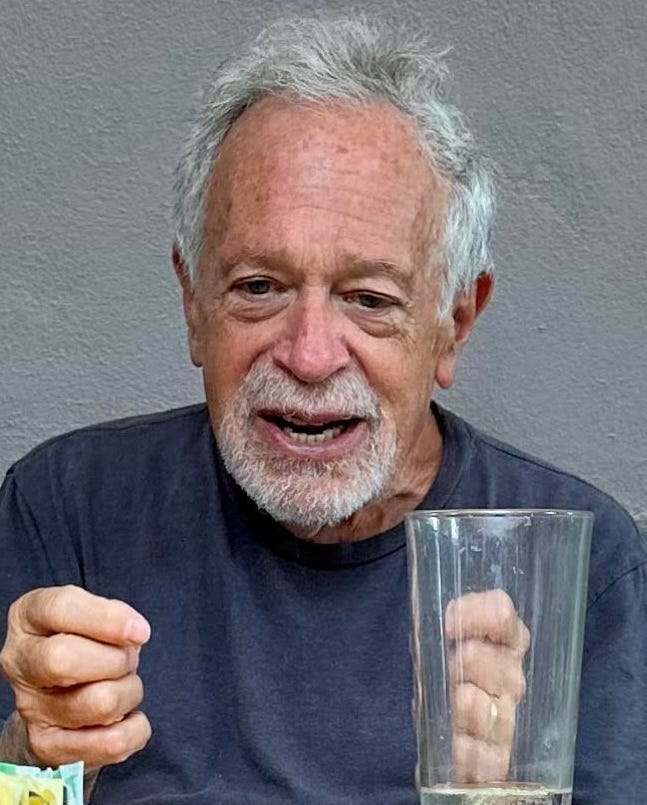Friends,
It’s been a ghastly two weeks. War, violence, and the deaths of innocent people — whether in Ukraine, Israel and Gaza, or on the streets of America — can cause even the most optimistic among us to doubt the capacities of human beings to live together peacefully on this earth.
Which is why it’s so important to seek the common good.
Last night, President Biden reminded us of that common good:
“In moments like these, when fear and suspicion, anger and rage run hard … we have to work harder than ever to hold on to the values that make us who we are. We’re a nation of religious freedom, freedom of expression. We all have a right to debate and disagree, without fear of being targeted in schools or workplaces or in our communities…. We reject all forms, all forms of hate, whether against Muslims, Jews, or anyone.”
In urging additional aid for Israel and Ukraine, the President also reminded us how important our common good is to the rest of the world:
“American leadership is what holds the world together. America is a beacon to the world, still, still. … Tonight, there are innocent people all over the world who hope because of us. Who believe in a better life because of us. Who are desperate not to be forgotten by us. And who are waiting for us.”
Which brings me to the central point of this series of Friday essays on the common good.
Many Americans today worry that our nation is losing its national identity. Yet the core of that identity is not the whiteness of our skin or our religion or our ethnicity.
It is the ideals we share, the good we hold in common.
That common good is a set of shared commitments. To the rule of law. To democracy. To tolerance of our differences. To equal political rights and equal opportunity. To participating in our civic life. To sacrificing for the ideals we hold in common. To upholding the truth.
We cannot have a functioning society without these shared commitments. Without a shared sense of common good, there can be no “we” to begin with.
If we are losing our national identity, it is because we are losing our sense of the common good. This is what must be restored.
As I’ve argued in these essays, recovering our common good depends on several things:
It depends on establishing a new ethic of leadership based on trusteeship. Leaders must be judged not by whether they score a “win” for their side, but whether they strengthen democratic institutions and increase public trust.
It depends on honoring those who have invested in the common good, and holding accountable those who have exploited it for their own selfish ends.
It requires that we understand — and educate our children about — what we owe one another as members of the same society. Instead of focusing solely on the rights of citizenship, we need also to focus on the duties of citizenship.
And it requires a renewed commitment to truth.
Some of you may feel such a quest to be hopeless. The era we are living in offers too many illustrations of greed, narcissism, brutality, and hatefulness.
I, however, firmly believe this quest is not hopeless.
Almost every day, I witness or hear of the compassion and generosity of ordinary Americans. Their actions rarely make headlines, but they constitute much of our daily life together.
The challenge is to turn all this into a new public spiritedness extending to the highest reaches in the land — a public morality that strengthens our democracy, makes our economy work for everyone, and revives trust in the major institutions of the nation.
The moral fiber of our society has been weakened but it has not been destroyed.
We can recover the rule of law and preserve our democratic institutions by taking a more active role in politics.
We can fight against all forms of bigotry. We can strengthen the bonds that connect us to one another by reaching out to one another. We can help resurrect civility by acting more civilly toward those with whom we disagree.
We can protect the truth by using facts and logic to combat lies.
We can help restore the common good by striving for it and showing others it’s worth the effort.
We have never been a perfect union. Our finest moments have been when we sought to live up to our shared ideals.
I worked for Robert F. Kennedy a half-century ago when the common good was better understood. Resurrecting it may take another half-century, or more.
But as the theologian Reinhold Niebuhr once said, “Nothing that is worth doing can be achieved in our lifetime; therefore we must be saved by hope. Nothing which is true or beautiful or good makes complete sense in any immediate context of history.”
Thank you for joining me on this journey. I hope you’ve found these essays useful and even on occasion inspiring. I hope you’ll join me in carrying forward the fight for the common good.
***
Subscribers to this newsletter are keeping it going. If you are able, please consider a paid or gift subscription. And we always appreciate your sharing our content with others and leaving your thoughts in the comments.
[photo by Michael Hoppé]







On a related note, if you find yourself questioning whether any sense of common good exists or thinking Professor Reich is just hoping we can somehow become some fantasy land, please turn off all mainstream tv shows and avoid typical newspapers for a while and then see how you feel. Remember that covering the countless stories of good people doing good things, stories that are everywhere even now in the face of horror, is simply not as profitable as plowing readers and viewers with endless rage-amplifying and terrifying stories.
Limit how many bleeds-it-leads stories that are being shoveled to your eyes, ears and brain and it becomes much easier to see how much good is actually around us.
Robert, a long-lens observation from New Zealand. The American I came to know and love was the 1970s version, when my coffee table groaned under the weight of picture books of America's iconic farmhouses, stunning national parks, and vibrant cities. Now having travelled to the US over 100 times over the last 50 years, I have mourned the slow decline of so many values I used to think were stitched into the fabric of American society. Now I see gun violence, inner city decay, and cult-leader led MAGA extremism. And a central driver of this decay? Not your failing, overpriced health system, not Republicans unable to even elect and retain a speaker, but US law enforcement, able on the basis of merely "we had a call" to stop and frisk innocent citizens, demand ID, deprive them of their 1st and 4th Amendment rights, and escalate to where over a thousand people are killed, shot, actually murdered, often over what started out as nothing more than a broken tail light. Individually, they are a tiny virus, but cumulatively, they exacerbate the decay of respect, trust, and civility.